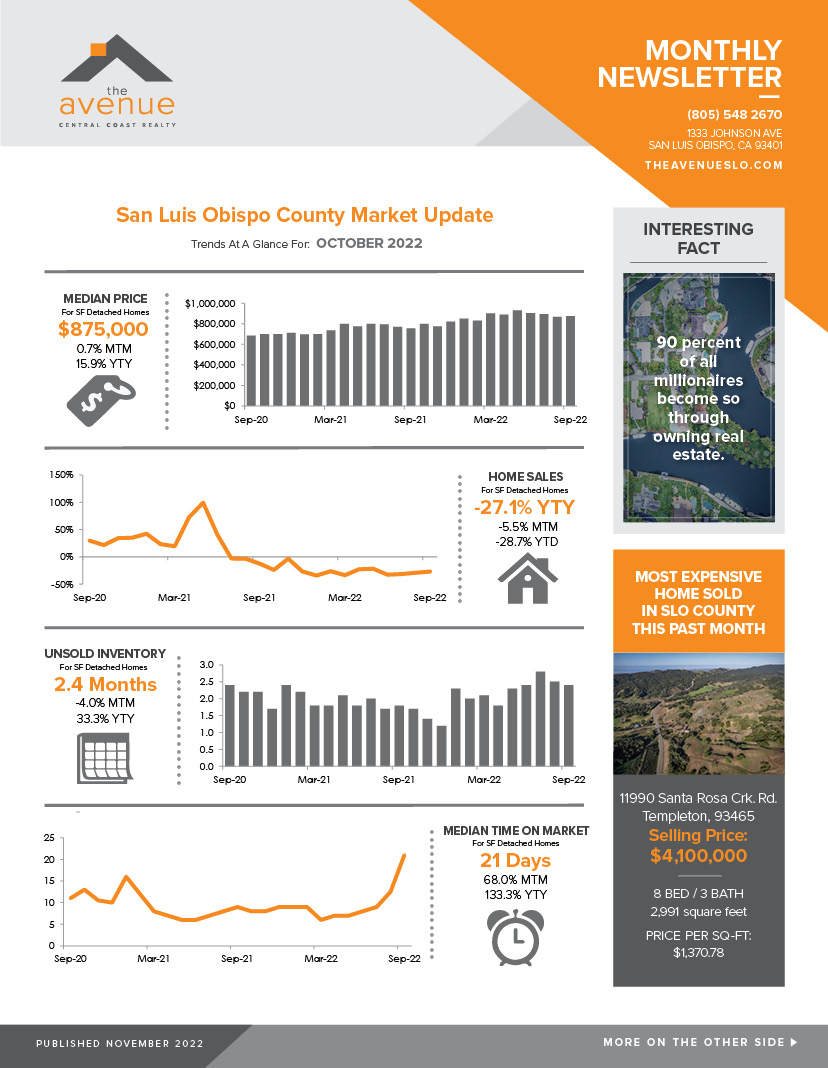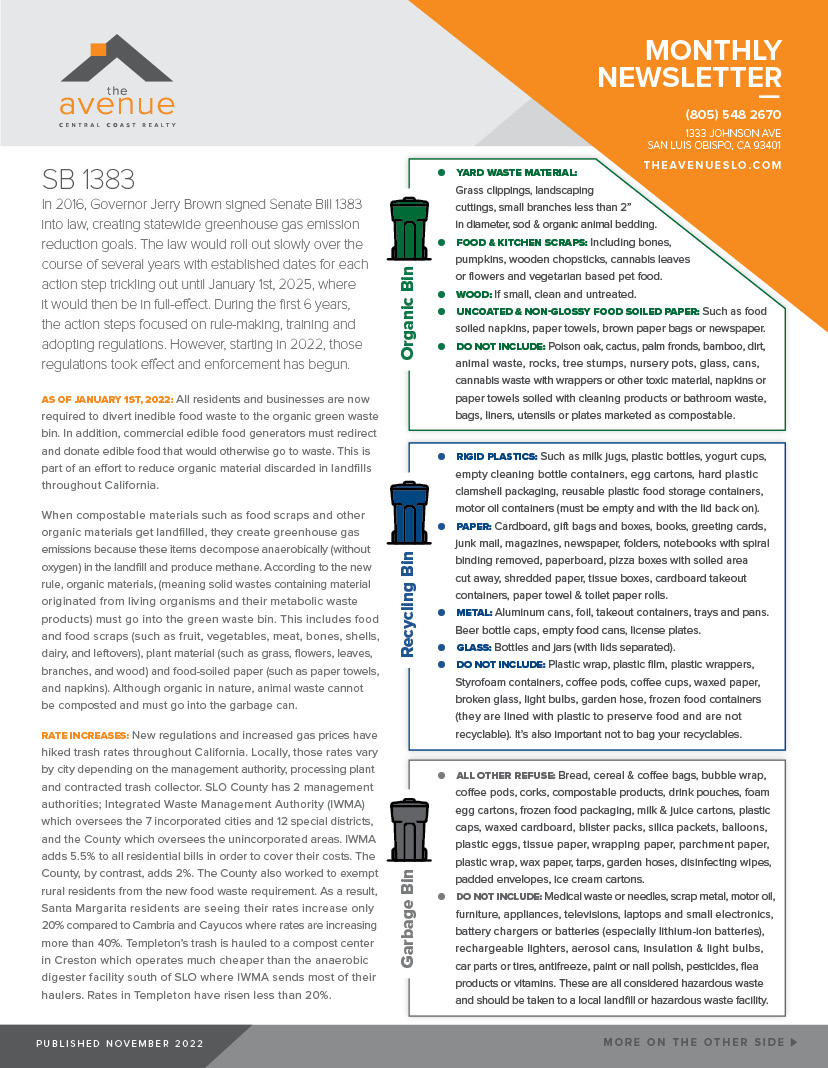SLO County Market Update / Senate Bill 1383 – statewide greenhouse gas emission reduction goal
In 2016, Governor Jerry Brown signed Senate Bill 1383 into law, creating statewide greenhouse gas emission reduction goals. The law would roll out slowly over the course of several years with established dates for each action step trickling out until January 1st, 2025, where it would then be in full-effect. During the first 6 years, the action steps focused on rule-making, training and adopting regulations. However, starting in 2022, those regulations took effect and enforcement has begun.
As of january 1st, 2022: All residents and businesses are now required to divert inedible food waste to the organic green waste bin. In addition, commercial edible food generators must redirect and donate edible food that would otherwise go to waste. This is part of an effort to reduce organic material discarded in landfills throughout California.
When compostable materials such as food scraps and other organic materials get landfilled, they create greenhouse gas emissions because these items decompose anaerobically (without oxygen) in the landfill and produce methane. According to the new rule, organic materials, (meaning solid wastes containing material originated from living organisms and their metabolic waste products) must go into the green waste bin. This includes food and food scraps (such as fruit, vegetables, meat, bones, shells, dairy, and leftovers), plant material (such as grass, flowers, leaves, branches, and wood) and food-soiled paper (such as paper towels, and napkins). Although organic in nature, animal waste cannot be composted and must go into the garbage can.
Rate Increases: New regulations and increased gas prices have hiked trash rates throughout California. Locally, those rates vary by city depending on the management authority, processing plant and contracted trash collector. SLO County has 2 management authorities; Integrated Waste Management Authority (IWMA) which oversees the 7 incorporated cities and 12 special districts, and the County which oversees the unincorporated areas. IWMA adds 5.5% to all residential bills in order to cover their costs. The County, by contrast, adds 2%. The County also worked to exempt rural residents from the new food waste requirement. As a result, Santa Margarita residents are seeing their rates increase only 20% compared to Cambria and Cayucos where rates are increasing more than 40%. Templeton’s trash is hauled to a compost center in Creston which operates much cheaper than the anaerobic digester facility south of SLO where IWMA sends most of their haulers. Rates in Templeton have risen less than 20%.
Yard Waste Material:
Grass clippings, landscaping cuttings, small branches less than 2” in diameter, sod & organic animal bedding.
Food & kitchen scraps:
Including bones, pumpkins, wooden chopsticks, cannabis leaves or flowers and vegetarian based pet food.
Wood:
If small, clean and untreated.
Uncoated & non-glossy food soiled paper:
Such as food soiled napkins, paper towels, brown paper bags or newspaper.
Do Not Include:
Poison oak, cactus, palm fronds, bamboo, dirt, animal waste, rocks, tree stumps, nursery pots, glass, cans, cannabis waste with wrappers or other toxic material, napkins or paper towels soiled with cleaning products or bathroom waste, bags, liners, utensils or plates marketed as compostable.
Rigid Plastics:
Such as milk jugs, plastic bottles, yogurt cups, empty cleaning bottle containers, egg cartons, hard plastic clamshell packaging, reusable plastic food storage containers, motor oil containers (must be empty and with the lid back on).
Paper:
Cardboard, gift bags and boxes, books, greeting cards, junk mail, magazines, newspaper, folders, notebooks with spiral binding removed, paperboard, pizza boxes with soiled area cut away, shredded paper, tissue boxes, cardboard takeout containers, paper towel & toilet paper rolls.
Metal:
Aluminum cans, foil, takeout containers, trays and pans. Beer bottle caps, empty food cans, license plates.
Glass:
Bottles and jars (with lids separated).
Do Not Include:
Plastic wrap, plastic film, plastic wrappers, Styrofoam containers, coffee pods, coffee cups, waxed paper, broken glass, light bulbs, garden hose, frozen food containers (they are lined with plastic to preserve food and are not recyclable). It’s also important not to bag your recyclables.
All Other Refuse:
Bread, cereal & coffee bags, bubble wrap, coffee pods, corks, compostable products, drink pouches, foam egg cartons, frozen food packaging, milk & juice cartons, plastic caps, waxed cardboard, blister packs, silica packets, balloons, plastic eggs, tissue paper, wrapping paper, parchment paper, plastic wrap, wax paper, tarps, garden hoses, disinfecting wipes, padded envelopes, ice cream cartons.
Do Not Include:
Medical waste or needles, scrap metal, motor oil, furniture, appliances, televisions, laptops and small electronics, battery chargers or batteries (especially lithium-ion batteries), rechargeable lighters, aerosol cans, insulation & light bulbs, car parts or tires, antifreeze, paint or nail polish, pesticides, flea products or vitamins. These are all considered hazardous waste and should be taken to a local landfill or hazardous waste facility.
Interesting Fact:
90 percent of all millionaires become so through owning real estate.




